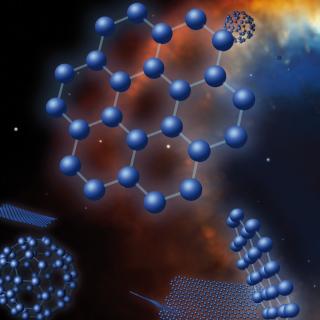Bibcode
Luna, R.; Cox, N. L. J.; Satorre, M. A.; García Hernández, D. A.; Suárez, O.; García Lario, P.
Bibliographical reference
Astronomy and Astrophysics, Volume 480, Issue 1, March II 2008, pp.133-148
Advertised on:
3
2008
Journal
Citations
43
Refereed citations
34
Description
In this work we present the results of a systematic search for diffuse
bands (DBs, hereafter) in the circumstellar envelopes of a carefully
selected sample of post-AGB stars. We concentrated on analyzing 9 of the
DBs most commonly found in the interstellar medium. The strength of
these features is determined using high-resolution optical spectroscopy,
and the results obtained are compared with literature data on field
stars affected only by interstellar reddening. Based on the weak
features observed in the subsample of post-AGB stars dominated by
circumstellar reddening, we conclude that the carrier(s) of these DBs
must not be present in the circumstellar environment of these sources,
or at least not under the excitation conditions in which DBs are formed.
This conclusion is applicable to all the post-AGB stars studied,
irrespective of the dominant chemistry or the spectral type of the star
considered. A detailed radial velocity analysis of the features observed
in individual sources confirms this result, as the Doppler shifts
measured are found to be consistent with an interstellar origin.
Related projects

Nucleosynthesis and molecular processes in the late stages of Stellar Evolution
Low- to intermediate-mass (M < 8 solar masses, Ms) stars represent the majority of stars in the Cosmos. They finish their lives on the Asymptotic Giant Branch (AGB) - just before they form planetary nebulae (PNe) - where they experience complex nucleosynthetic and molecular processes. AGB stars are important contributors to the enrichment of the
Domingo Aníbal
García Hernández